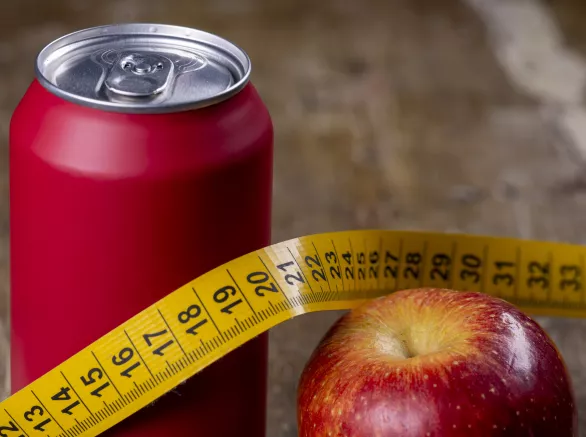Scrafford C, Davis B, Higgins K, Moynihan E, Morris-Schaffer K, Anderson M, Rackl S, Hearon S, Davis D. Estimated long-term dietary exposure to cadmium from consumption of spinach in the United States: a probabilistic assessment. Food Chem Toxicol. 2025 Jan 22; 197:115269. doi: 10.1016/j.fct.2025.115269.
Higgins K, Rawal R, Kramer M, Baer D, Yerke A, Klurfeld D. An overview of reviews on the association of low calorie sweetener consumption with body weight and adiposity. Advances in Nutrition 2024 Aug 8; 100239. doi: 10.1016/j.advnut.2024.100239.
O'Connor S, O'Connor L, Higgins K, Bell B, Krueger E, Rawal R, Hartmuller R, Reedy J, Shams-White M. Conceptualization and assessment of 24hr timing of eating and energy intake: a methodological systematic review of the chronic disease literature. Advances in Nutrition 2024. https://doi.org/10.1016/j.advnut.2024.100178.
O'Connor L, Higgins K, Smiljanec K, Bergia R, Brown A, Baer D, Davis C, Ferruzzi M, Miller K, Rowe S, Rueda J, Andres A, Cash S, Coupland J, Crimmins M, Fiecke C, Forde C, Fukagawa N, Hall K, Hamaker B, Herrick K, Hess J, Heuven L, Juul F, Malcomson F, Martinez-Steele E, Mattes R, Messina M, Mitchell A, Zhang F. A research roadmap about processed foods, food processing, and human health in the context of the US food system: Proceedings from an interdisciplinary workshop. Advances in Nutrition 2023 Sep 16; S2161-8313(23)01378-9.
Ye Q, Devarshi P, Grant R, Higgins K, Mitmesser S. Lower intakes of key nutrients are associated with more school and workplace absenteeism in US children and adults: a cross-sectional study of NHANES 2003-2008. Nutrients 2023 Oct 13; 15(20):4356. doi: 10.3390/nu15204356.
Higgins K, Rawal R, Baer D, O'Connor L, Appleton K. Scoping review and evidence map on the relationship between exposure to dietary sweetness and body weight-related outcomes in adults. Advances in Nutrition 2022 Dec 22; 13(6):2341-2356.
Higgins K, Bi X, Davis B, Barraj L, Scrafford C, Murphy M. Adequacy of total usual micronutrient intakes among pregnant women in the United States by level of dairy consumption, NHANES 2003-2016. Nutrition and Health 2022 Dec; 28(4):621-631.
Murphy M, Barraj L, Higgins K. Healthy U.S.-style dietary patterns can be modified to provide increased energy from protein. Nutrition Journal 2022 Jun 18; 21(1):39.
Davis B, Bi X, Higgins K, Scrafford C. Gestational health outcomes among pregnant women in the United States by level of dairy consumption and quality of diet, NHANES 2003-2016. Maternal & Child Health Journal 2022 Oct; 26(10):1945-1952.
Higgins K, Hudson J, Hayes A, Braun E, Cheon E, Couture S, Gunaratna N, Hill E, Hunter S, McGowan B, Reister E, Wang Y, Mattes R. Systematic review and meta-analysis on the effect of portion size and ingestive frequency on energy intake and body weight among adults in randomized controlled feeding trials. Advances in Nutrition 2022 Feb 1; 13(1):248-268.
Murphy M, Scrafford C, Barraj L, Bi X, Higgins K, Jaykus LA, Tran N. Potassium chloride-based replacers: modeling effects on sodium and potassium intakes of the US population with cross-sectional data from NHANES 2015 — 2016 and 2009 — 2010. American Journal of Clinical Nutrition 2021 Jul 1; 114(1):220-230.
Murphy M, Higgins K, Bi X, Barraj L. Adequacy and sources of protein intake among pregnant women in the United States, NHANES 2003-2012. Nutrients 2021 Feb 28; 13(3):795.
Cowan A, Higgins K, Fisher J, Tripicchio G, Mattes R, Zou P, Bailey R. Examination of different definitions of snacking frequency and associations with weight status among U.S. adults. PLoS ONE 2020 Jun 17; 15(6):e0234355
Higgins K, Barraj L, Reiss R. 2020. Supplemental statistical analysis of organophosphorus (OP) pesticides in vitro inhibition study. EPA Federal Insecticide, Fungicide, and Rodenticide Act Scientific Advisory Panel. Docket ID EPA-HQ-OPP-2020-0263.
McArthur B, Higgins K, Hunter S, and Mattes R. Energetics of nut consumption: oral processing, appetite, and energy balance. Health Benefits of Nuts and Dried Fruits. Chapter. 2020.
Higgins K, Mattes R. A randomized controlled trial contrasting the effects of four low calorie sweeteners and sucrose on body weight in adults with overweight or obesity. American Journal of Clinical Nutrition 2019 May 1; 109(5):1288-1301.
Higgins K, Hunter S, Mattes R. Sensory, gastric, and enteroendocrine effects of carbohydrates, fat, and protein on appetite. Current Opinion in Endocrine and Metabolic Research 2019; 4:14-20.
Higgins K, Considine R, Mattes R. Aspartame consumption for 12 weeks does not affect glycemia, appetite, or body weight of healthy, lean adults in a randomized controlled trial. The Journal of Nutrition 2018; 148(4):650-657.
McArthur B, Higgins K, Hunter S, and Mattes R. Energetics of nut consumption: oral processing, appetite, and energy balance. Health Benefits of Nuts and Dried Fruits 2018.
Running C, James B, Hollis J, Higgins K. Session 3 discussion: the microstructure of eating. Physiology & Behavior 2018.
Wittekind A, Schwarz C, McGale L, Stamataki N, Higgins K, Beauchamp B, Nicklaus S, de Graaf C, Gibson S, Rogers P, Mattes R, McLaughlin J, Dussort P, Marsaux C, Mela D, Halford J, Bonnema A, Macdonald I. A workshop on 'Dietary Sweetness - Is It an Issue?' International Journal of Obesity 2018; 42:934-938.
Carreiro A, Dhillon J, Gordon S, Higgins K, Jacobs A, McArthur B, Redan B, Rivera R, Schmidt L, Mattes R. "Endocrine Responses to Protein." The macronutrients, appetite, and energy intake. Annual Review of Nutrition 2016 Jul 17; 36:73-103.
Leidy H, Hoertel H, Douglas S, Higgins K, Shafer R. 2015. A high‐protein breakfast prevents body fat gain, through reductions in daily intake and hunger, in "Breakfast skipping" adolescents. Obesity 2015 Sep; 23(9):1761-4.
Presentations
Quiros AM, Higgins K, Slayne M, McClements DJ, Socolovsky S, Schiff H. How can we rethink the future of so-called ultra-processed foods with science in mind? IFT FIRST Scientific & Technical Forum, Chicago, IL, 2025.
Higgins K. The ketogenic potential of tri-betahydroxybutyrin, a ketone tri-ester. 16th Congress for the International Society for the Study of Fatty Acids, Quebec City, Quebec, 2025.
Higgins K. Sweetness: the science and the misconceptions. 2025 World Sugar Research Organisation Annual Meeting, Guadalajara, Mexico, 2025.
Higgins K, Rosales A, Gilbert J. Challenges and research gaps around ultra-processed foods. Congressional Lunch & Learn, Washington, DC, 2025.
Higgins K, Karaken D. Alcohol and ultra-processed foods: understanding the drivers of desire, intake, and "addiction". Institute for Food Technologists Food Policy Impact, Washington, DC, 2025.
Higgins K, Kamil A, Sheth V. Science of sweetness: a review of current evidence and common misconceptions. 2025. https://www.pepsicohealthandnutritionsciences.com/educational-resources/science-sweetness-review-current-evidence-and-common-misconceptions
Higgins K, Brown A, Keitt A, Chiavaroli L, Cowan-Pyle A, Erndt-Marino J, Vorland C. 2024. Lumping and Splitting Dialogue Mapping, Morrilton, AR, 2024.
Higgins K. USDA research on sweetness and sweeteners and sugars. Calorie Control Council (CCC) 2024 Annual Meeting and Educational Symposium, Washington, DC, 2024.
Higgins K. Low- and no-calorie sweeteners and body weight: how systematic reviews produce disparate results. 2024. https://iafns.org/low-no-calorie-sweeteners-what-does-the-science-really-say/
Higgins K. Mechanisms low calorie sweeteners may (or may not) influence energy and glycemic regulation. Oral Presentation, Canadian Nutrition Society, Non-nutritive Sweetener & Health: Unravelling the Evidence & Controversy, Toronto, ON, 2024.
Higgins K, Jones J, Mattes R, O'Connor L. Ultra-processed foods: current challenges and future directions. Oral Presentation, American Society for Nutrition, Nutrition 2023, Boston, MA, 2023.
Higgins K, Rawal R, Kramer M, Baer D, Klurfeld D. An overview of reviews on the association of low calorie sweetener consumption with body weight and adiposity. Poster, American Society for Nutrition, Boston, MA. 2023.
Higgins K, de Graaf K. Dietary sweetness & body weight: what do we know and where do we go from here? Webinar, 2023. https://iafns.org/event/dietary-sweetness-and-body-weight/
Higgins K, Dawson H, Rhodes D, McKillop K, Fukagawa N. Sources and intake of added sugars in the US diet. Webinar, IAFNS-USDA Beltsville Webinar Series, 2022. https://iafns.org/event/iafns-usda-beltsville-webinar-series/
Higgins K, Rawal R, Baer D, O'Connor L, Appleton K. Evidence map on the relationship between exposure to dietary sweetness and body weight-related outcomes in adults. Poster, American Society for Nutrition, Nutrition 2022, Virtual Conference, 2022.
Morton S, Rhodes D, Higgins K, Moshfegh A. Increased adherence to added sugars recommendation among Americans, what we eat in America, NHANES, 2005-2008 and 2015-2018. Poster, American Society for Nutrition, Nutrition 2022, Virtual Conference, 2022.
O'Connor L, Higgins K, Herrick K. Estimating lean and non-lean oz-equivalents of red meat and poultry using the USDA's food patterns equivalents database. 42nd Annual National Nutrient Databank Conference, Virtual Conference, 2022.
Higgins K. New job 101: job search strategies, networking and interview tips for aspiring professionals. Nutrition 2021 Live Online, Virtual Conference, 2021.
Higgins K, Reiss R, Chambers J, Lennox K. OP In vitro Inhibition program: introduction to testing program — statistical analysis of data. EPA Federal Insecticide, Fungicide, and Rodenticide Act Scientific Advisory Panel. Docket ID EPA-HQ-OPP-2020-0263.
Higgins K, Mattes R. A randomized controlled trial contrasting the effects of four low calorie sweeteners and sucrose on body weight in adults with overweight or obesity. International Life Sciences Institute (ILSI), Webinar, 2018.
Higgins K. Twelve week consumption effects of five sweeteners on body weight, energy intake, and energy expenditure. Oral prestation, Nutrition 2018, Boston, MA, 2018.
Higgins K. Farmer to farmer household soy processing in Mikumi, Tanzania. Oral presentation, Catholic Relief Services Brown Bag Series, Baltimore, MD. 2016.
Higgins K. TZ36 soy processing. Oral presentation, Catholic Relief Services, Dar es Salaam, Tanzania. 2015.


